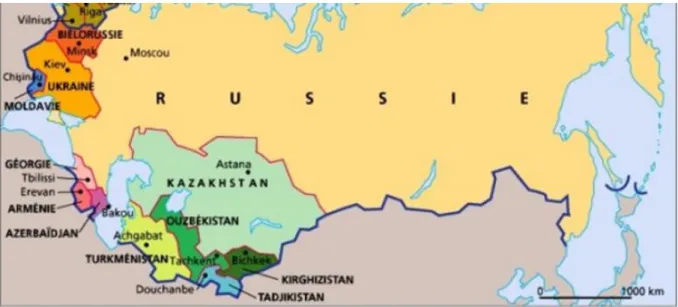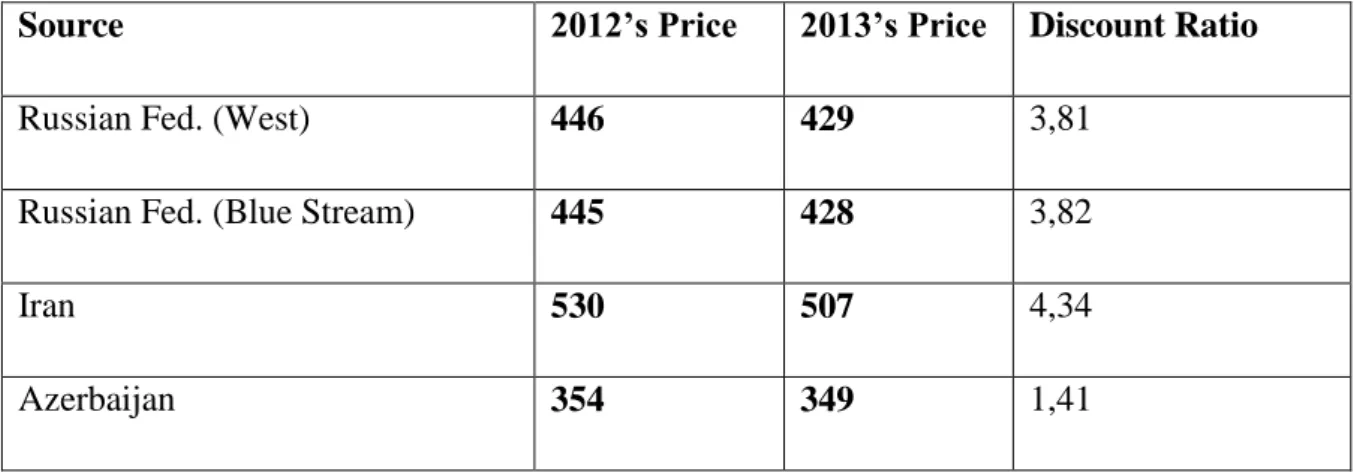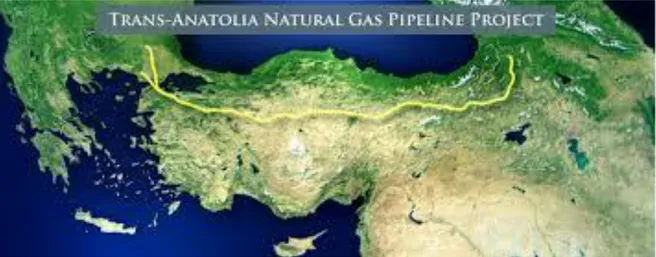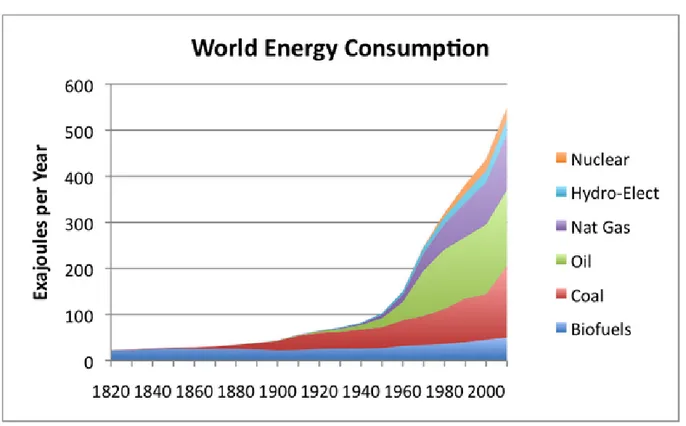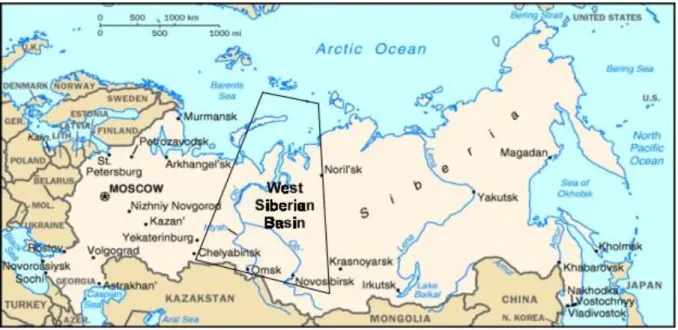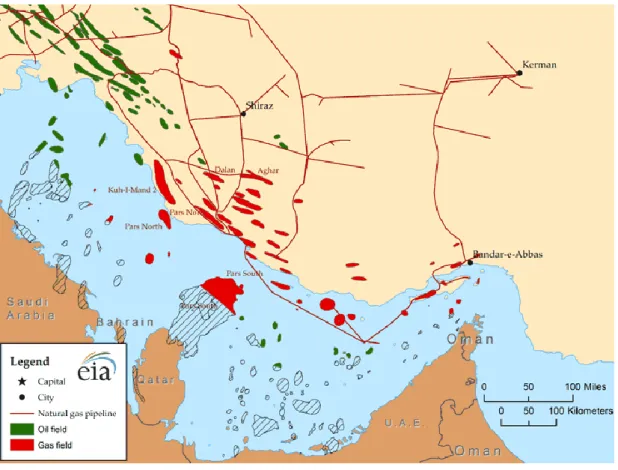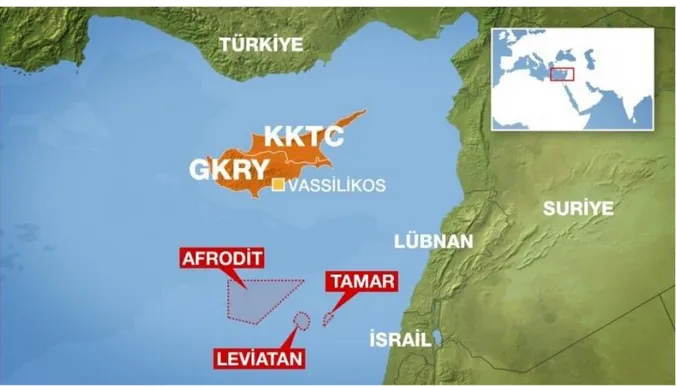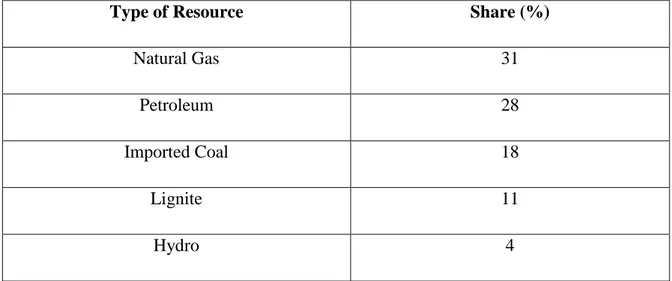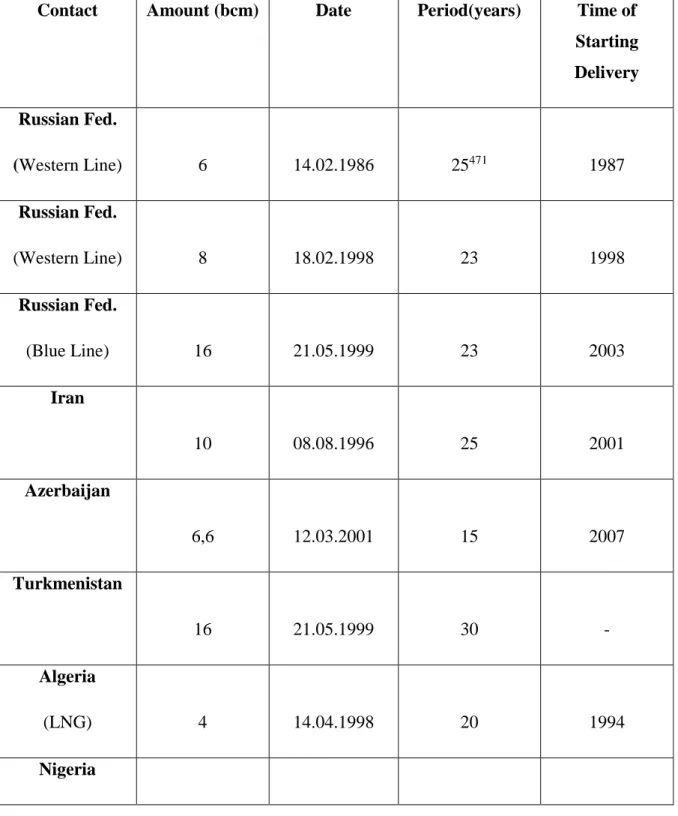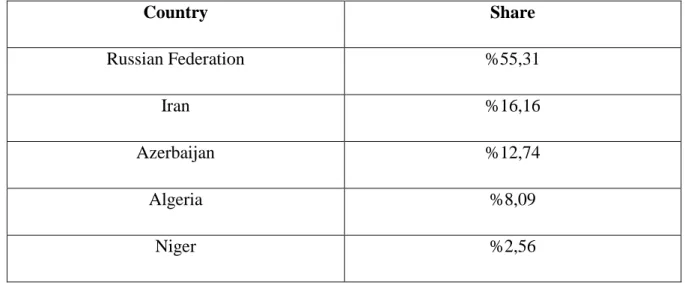AN ASSESSMENT OF THE CHANGING DYNAMICS IN
TURKISH-AZERBAIJANI ENERGY RELATIONS SINCE
THE END OF COLD WAR
Ayhan Gücüyener
112674008ISTANBUL BILGI UNIVERSITY SOCIAL SCIENCES INSTITUTE
INTERNATIONAL POLITICAL ECONOMY GRADUATE PROGRAM
Academic Advisor: Şadan İnan Rüma February, 2017
i TEŞEKKÜR
Bu çalışmanın gerçekleştirilmesinde, iki yıl boyunca enerjinin akademik yönüne ilişkin tüm değerli bilgilerini benimle paylaşan ve çalışmamda çok büyük emeği geçen Cem Deniz Kut’a; tezimi hazırlamamda yüksek lisans öğrenimim boyunca hiçbir yardımını esirgemeyen Yrd. Doç. Dr. Şadan İnan Rüma’ya, çalışmam boyunca benden bir an olsun desteğini esirgemeyen kardeşim Neslihan Gücüyener’e sonsuz teşekkürlerimi sunarım.
İstanbul, 2017 Ayhan Gücüyener
ii ABSTRACT
One nation-two countries became a fashionable motto in Turkish-Azerbaijani relations which has been promoted since 1990’s. After the collapse of Soviet Union two countries became closer and strong cooperation showed its impact on social, economic and political fields. However, the most significant progress was observed in energy field and the current era of Turkish-Azerbaijani relations could be called as “energy relations” period according to many scholars.
Nevertheless, despite the increasing importance of “energy” in bilateral relations, most of the existing literature examines Turkish-Azerbaijani relations mostly by focusing on the political and historical process. Moreover, the field in energy cooperation is generally seen as a product of close historical bilateral relations. As a result, this study aims to investigate the nature of energy relations and try to focus on the real reason lies behind the energy cooperation between two countries. As a result, it could be claimed that two counties’ different but complementary approaches to energy security phenomenon, interdependency, and mutual benefits obtained from energy trade consolidate the bilateral relations and trigger a solid cooperation in energy field.
Key Words: Energy, South Caucasus, Interdependence, Mutual Benefit, Pipeline, Natural
iii ÖZET
Bir Millet-İki Devlet terimi Türkiye-Azerbaycan ilişkileri için 1990’lı yıllardan bu yana en sık kullanılmakta olan sembollerdendir. Özellikle, Sovyetler Birliği’nin çöküşünün ardından, iki devletin giderek yakınlaştığı ve bu yakın işbirliğinin sosyal, ekonomik ve siyasi alanlara da yansıdığı görülmektedir. Bununla beraber, tüm işbirliği alanları arasında, en çok ilerleme enerji alanında gözlemlenmiştir. Hatta enerji alanında gelişen işbirliğine istinaden bazı uzmanlar günümüzdeki Türkiye-Azerbaycan ilişkileri enerji dönemi olarak tanımlamaktadır.
Öte yandan, enerjinin ikili ilişkilerdeki önemine rağmen, günümüzde Türkiye-Azerbaycan ilişkilerine ilişkin yayınların çoğunlukla siyasi ve tarihi perspektif üzerine yoğunlaştığı gözlemlenmektedir. Bunun yanı sıra, enerji alanındaki işbirliği genellikle iyi giden siyasi ilişkilerin bir uzantısı ve ürünü olarak görülmüştür.
Bu çerçevede, bu çalışma iki ülke arasındaki enerji ilişkilerinin gerçek doğasını anlamayı ve iki ülke arasındaki enerji alanındaki işbirliğinin altında yatan ana sebepleri araştırmayı amaçlamaktadır. Sonuç olarak görülmektedir ki, iki ülke arasındaki sağlam enerji ilişkilerinin temelinde, iki ülkenin farklı ancak birbirini tamamlayıcı enerji güvenliği anlayışları, karşılıklı bağımlılık öğesi ve enerji ticaretinden sağlanan karşılıklı fayda yatmaktadır.
Anahtar Kelimeler: Enerji, Güney Kafkasya, Karşılıklı Bağımlılık, Ortak Fayda, Boru
iv TABLE of CONTENT
Chapter 1: Turkish-Azerbaijani Relations from a Historical Perspective...4 1.a. Political History of Turkish-Azerbaijani Relations since
Independence……….5
1.a.1. 1991-1993 Naiveté and Romanticism: Expectations versus Real Capacity……….5 1.a.2. Disappointment and Understanding Shortcomings (1993-1995)...10 1.a.3. Realism and Pragmatism Period (1995-2001)………...12 1.a.4. Time for Normalization and Institutionalization (2001-2012)………..13 1.b. Understanding Big Picture: the New World Order, Competition on Energy Resources
and its Impacts on South
Caucasus………...17
1.b.1 Russian Federation’s Attitude Towards South Caucasus since
1991………..18
1.b.2 Caucasus and United States: Pipeline
Diplomacy………...22
1.b.3 Iran’s Perceptions on South
Caucasus………...25
1.b.4 European Union: Ensuring Energy
Security……….32
1.c. Political History of Turkish-Azerbaijani Relations: Where Energy Stands?
………..28 Chapter 2: Building a Theoretical Framework for the Quest of Energy and
Cooperation………..39
2.a What Does Energy Security Mean in Foreign
v 2.b The Quest for Natural Resources in Theoretical
Perspective………...47
2.b.1 Realist Approach...47 2.b.2 Liberal
Approach………..51
2.b.3 Neo Realists Versus Neo Liberals………..55 2.c Considering “Interdependence” Theory with Energy
Security……….57
2.d Energy Relations from an Institutionalist
Perspective………65
Chapter 3: Assessing ‘Politics of Energy’ In Bilateral Relations: Mean of ‘Energy’ For
Turkey and
Azerbaijan………69
3.a Integrating Energy in Foreign Policy
Making………...69
3.b Turkey’s Energy Strategy: Determinants and Policy
Implications………..72
3.b.1. A Favorable Geopolitical
Position……….75
3.b.2 Turkey: An Energy Hunger
Country……….91
3.b.3 Turkey’s Energy Hub Strategy and the Role of
Azerbaijan………..99
3.c Azerbaijan’s Energy Policy: Where Energy Stands in Foreign
vi 3.c.1 Economic Recovery: Azerbaijan’s Economic Viability and Energy
Exports………103
3.c.2 Energy as a Tool in Azerbaijan’s Foreign
Policy………..108
3.d Assessing Turkish-Azerbaijani Energy Relations and Understanding the
Dynamics………113
Conclusion...117 Bibliography...120 Annex 1: Interview with
vii ABBREVIATONS
AGRI: Azerbaijan-Georgia-Romania Interconnector AIOC: Azerbaijan International Operating Company BCM: Billion cubic meters
BTC: Baku-Tbilisi-Ceyhan Crude Oil Pipeline BTE: Baku-Tbilisi-Erzurum Natural Gas Pipeline CSIS: The Center for Strategic and International Studies EBRD: European Bank for Reconstruction and Development EC: European Commission
EMRA: Energy Market Regulation Agency EU: European Union
FDI: Foreign Direct Investment FPA: Popular Front of Azerbaijan IEA: International Energy Agency IPE: International Political Economy IR: International Relations
LNG: Liquefied Natural Gas
MoU: Memorandum of Understanding NATO: North Atlantic Treaty Organization NGO: Non-Governmental Organization NIS: New Independent States
PSA: Production Sharing Agreement
viii TAP: Trans-Adriatic Pipeline Project
TCP: Trans-Caspian Pipeline SGC: Southern Gas Corridor
SOCAR: State Oil Company of Azerbaijan
SOFAZ: State Oil Fund of Republic of Azerbaijan UN: United Nations
ix LIST of TABLES
Table 1: Natural Gas Prices for Turkey and Discounts according to Resources Table 2: How Strategic and Market-based Approach Assess Energy Affairs Table 3: Linking Energy Security and Foreign Policy
Table 4: Oil Rich Countries in Turkey’s Close Region
Table 5: Natural Gas Rich Countries in Turkey’s Close Region (bcm) Table 6: Turkey’s Primary Energy Supply in 2013
Table 7: Natural Gas Purchasing Contracts for Turkey Table 8: Main Natural Gas Suppliers of Turkey in 2015 Table 9: On the Path to Become an Energy Hub
x LIST of FIGURES
Figure 1: Emergence of New Independent States Figure 2: The Planned Route for Nabucco Pipeline
Figure 3: ACG Oilfield Map in Azerbaijan’s Caspian Offshore Figure 4: BTC as the New Component of East-West Energy Corridor Figure 5: The Proposed Route for Trans-Caspian Pipeline
Figure 6: The Implementation of TANAP Project
Figure 7: Global Energy Consumption Has Been Increasing Since Industrial Revolution Figure 8: The Energy Relation of EU Member States and Russian Federation
Figure 9: Location of West Siberian Basin in Russian Federation and Concentration of
Resources
Figure 10: Iran’s Oil and Gas Fields
Figure 11: Turkmenistan’s Oil and Gas Field’s Map
Figure 12: Natural Gas Bonanza in East Med Region and Discovered Fields Figure 13: The Changes in Azerbaijan’s GDP
1 INTRODUCTION
After the dissolution of Soviet Union, Azerbaijan was assumed as the most important state that every expert predicted Turkey would make most progress in its post-Cold War relations.1 Especially in early 1990’s the perception of Turkey was not just seems as a friendly but also fraternal country and a natural ally for Azerbaijan.2 Nevertheless, today most of the authors and scholars argue that it is time to develop more realistic and mature partnership between these two countries. Besides, they suggest that the relations should be accelerated to “strategic partnership” level.3
In addition to the political dimension, economic ties have had a special role in building strategic partnership which offers mutual benefits for all parties. Bilateral trade, joint energy projects, foreign direct investments (FDI) created a solid basis to two countries’ multi-faced strategic cooperation. Especially after 1993, various limitations for both counties emerged, “romantic” period in relations has over and a more “pragmatic” era in bilateral relations has started. As a result “cooperation on energy” field has constituted an important component. Additionally, energy commodity trade and implementation of joint energy projects (for example: BTC and TANAP Pipelines) became the most crucial catalyst in the progress of relations for both countries.
Even though, “energy” constitutes a crucial part of modern states’ foreign policy agenda, the lack of theoretical or conceptual background makes studying on energy security more challenging. As Brenda Shaffer points out in the journal of International Security which is a principal journal in international affairs and security studies, only eight articles have appeared in the journal’s thirty year history.4 With respect to these significant gaps, this academic study aims to fill the gaps in three main points.
Firstly, it is possible to distinguish that despite the importance and determinant role of “energy” mainly in terms of trade of energy commodities, most of the existing literature on Turkish-Azerbaijani relations is based on historical, cultural or political facts. Turkey’s
1 Mustafa Aydın, “Turkish Policy Towards Caucasus”, The Quarterly Journal, p.44
2 Nazrin Mehdiyeva, Power Games in the Caucasus: Azerbaijan's Foreign and Energy Policy towards the
West, Russia and the Middle East, 2011, p.153
3 Reha Yılmaz, “Türkiye-Azerbaycan İlişkilerinde Son Dönem”, Çankırı Üniversitesi, p.37
4 Ronald Dannreuther, “International Relations Theories: Energy, Minerals and Conflict”, Polinares Working
2
approach to Central Asian Countries and NIS (Newly Independent States) became a popular topic since the end of Cold War. However, the direct reference to “Azerbaijan” is relatively underestimated. Thus this study aims to consider energy as the cornerstone of bilateral relations. Nevertheless, it should be reminded that energy is a large and inclusive notion and by mentioning “energy” mostly oil and gas will be referred.
Secondly, even though the energy literature has been expanding since the end of the Cold War, understanding the changing dynamics for both countries was another main research motivation of this study. For example, Turkey’s energy demand is significantly increasing and ensuring the reliable supply amounts of natural gas became a vital and crucial foreign policy agenda when the requirements is compared with the early 90’s. Simultaneously, Azerbaijan’s geo-political focused energy policy has been transforming and it is becoming more geo-economic which takes into account the rationality of market.
Finally, even though, “energy” plays a crucial role in shaping states’ foreign policy agenda from security and economics perspective, the current energy security literature is unsystematic and lack of theoretical perspective. There has not been a systematic approach or cumulative literature incorporating energy security into foreign policy and energy economics to international political economy. These two tracks generally considered as the separate disciplines. As a result, this study aims to create an added value for energy security literature.
From these assumptions, this study mainly aims to investigate: What is the central motivation of Turkish-Azerbaijani cooperation in energy field and which theoretical frameworks could interpret the nature of this cooperation with respect to the changing dynamics since the end of Cold War?
In that respect, this research will benefit from quantitative and qualitative research tools and comparative research methods in order to reach a solid analysis. While qualitative research methods are generally used to gain an understanding of underlying reasons, opinions and motivators in a fact, during this academic research existing literature and arguments were reviewed from an inductive approach and individual opinions of subject matter experts were taken into account. Additionally, in this study, quantitative method is mostly used to qualify a problem or a phenomenon by the way of generating the numerical data into statistics and information that energy studies require data and analytics for a rational analysis.
3
Finally, addressing the opinion of various experts by making personal interviews emerges as another research methodology for make a comparison about the existing theories. In that respect, during the next chapters, the determinants of bilateral energy relations will be assessed by taking into consideration historical, political and economic perspectives. In the first chapter, historical process of bilateral relations will be assessed after the dissolution of Soviet Union. Secondly, the role of energy in foreign policy making process will be explained by addressing various foreign policy and political economy theories. Finally, the role of energy in bilateral relations will be mentioned by taking into consideration national energy policies of both states.
4 CHAPTER 1
ASSESSING THE TURKISH-AZERBAIJANI RELATIONS FROM A HISTORICAL PERSPECTIVE
It is generally recognized that Turkey’s relations with Azerbaijan are determined by historical, cultural, ethnic and religious connections. In addition to these factors, cooperation in energy field has been a key factor in bilateral relations.5 According to a Turkish scholar Ayça Ergun, four different dimensions could be used in interpreting Turkish-Azerbaijani relations: The capacity and limitations of Turkish foreign policy after the end of Cold War (1), the interest and attitude of West regarding the implementation of regional security (2), the international, regional and national economic interests (mostly the transportation and usage of hydrocarbon resources) (3), the mutual perception of two states.6(4)
Nevertheless, Turkish-Azerbaijani relations are not perfect and the recently observed “ups and downs” in bilateral relations means that the period of “romanticism” has over.7 Especially, after 1993, a more “pragmatic” nature in bilateral relations has started and “cooperation in energy” field has constituted an important component. In that regard, if the “energy cooperation” between countries is intended to be interpreted by addressing international political economy’s and/or international relations disciplines’ theoretical perspective, the foreign policy attitudes of both states and the global political context could not be ignored. In addition, Turkish-Azerbaijani relations could not be separated from Turkish Foreign Policy attitude towards Central Asia and Caucasus as well. Finally, the foreign policy dynamics of newly independent Azerbaijan is crucial for this research. In that sense, during this chapter, bilateral relations under a historical perspective will tried to be handled under the Turkey’s “new activism” in foreign policy where Central Asia and Caucasus have emerged as focal points for Turkish foreign policy after the end of the Cold War. Simultaneously the new dynamics and motives in Azerbaijan’s foreign policy in the post-independence period will be assessed simultaneously.
5 Bülent Aras, “Turkish-Azerbaijani Energy Relations”, Istanbul Policy Center, April, 2014, p.3
6 Ayça Ergun, “Türkiye-Azerbaycan İlişkileri”, Mustafa Aydın (ed.), Türkiye’nin Avrasya Macerası:
1989-2006, Nobel, İstanbul, 2007, p.241-251
5 1. a. Political History of Turkish-Azerbaijani Relations since Independence
For most of the scholars, the general remarks and policy attitudes of Turkish Foreign Policy through Central Asia and Caucasus after the collapse of Soviet Republic could be evaluated in four main periods: Naiveté8 and romanticism (1991-1993), Disappointment and Understanding Shortcomings (1993-1995), Realism and Pragmatism (1995-2001)9, Normalization and Institutionalization (2001-2012).10 While the Turkish-Azerbaijani energy relations cannot be evaluated separately from general Turkish foreign policy attitude towards newly independent Central Asian countries, a similar classification could be implemented for Turkish-Azerbaijani relations. For example, Orhan Gafarli who is an experienced expert on Turkish-Azerbaijani relations mentioned the realization of giant projects like BTK (Baku-Tbilisi-Kars) Railway which is an essential part of TRACECA (Transport Corridor Europe-Caucasus-Asia) assessed the changing dynamics in Turkish-Azerbaijani relations with a concept defining the way “from Romance to Pragmatism”.11
1. a. 1. 1991-1993 Naiveté and Romanticism: Expectations versus Real Capacity
The end of the Cold War and the collapse of Soviet Union left no region or country unaffected. It had altered the character of the international political system and its regional subsystems.12 Especially, for Turkey, this period has highlighted the neglected historical and geographical reality of interconnectedness with its environs. According to Kadri Kaan Renda, the recent activism in Turkish foreign policy and the changing nature of relations with neighbors requires a study which will focus on increasing interdependence. According to author, this new activism in foreign politics facilitates international cooperation, thus it creates a “complex interdependence.”13
Energy relations have a special and crucial role in the creation of this complex interdependence with newly independent states. In addition to new period’s political and
8Carlo Frappi, “Central Asia’s Place in Turkey’s Foreign Policy”, ISPI, December, 2013, p. 2
9Baskın Oran (Ed.), Türk Dış Politikası: Kurtuluş Savaşından Bugüne Olgular, Belgeler, Yorumlar, Vol.2,
2009, İstanbul, p. 366
10 Baskın Oran(Ed.), Türk Dış Politikası: Kurtuluş Savaşından Bugüne Olgular, Belgeler, Yorumlar:
2001-2012, Vol.3, 2013, İletişim Yayınları, p.468
11 Orhan Gafarli, “Turkey-Azerbaijan Relations: From Romance to Pragmatism”, The Jamestown Foundation,
15.01.2015, Access: https://jamestown.org/program/turkey-azerbaijan-relations-from-romance-to-pragmatism/
12 Shireen Hunter, “Turkey, Central Asia and The Caucasus: Ten Years of Independence”, Southeast
European and Black Sea Studies, Vol. 1, No. 2, 2001, p.5.
13 Kadri Kaan Renda, “Turkey’s Neighborhood Policy: An emerging Complex Interdependence”, Insight Turkey, Vol.13, No.1, 2011, p.89.
6
economic impacts, the dissolution of Soviet Union has profoundly changed and updated traditional energy geopolitics which has led to emergence of a new energy rich location: Caspian Region. On the other hand, while the international political system has been re-emerging and re-defining since the end of the Cold War, Turkey has found it-self at the center of an emerging region: Eurasia. In addition, as NATO (North Atlantic Treaty Organization)’s role in a post-Cold War World was opened up for discussion, Turkey came up against a “security limbo”.14
Despite Turgut Özal’s personal leadership and active foreign policy understanding, there were crucial factors which forced to Turkey to lead a more multidimensional foreign policy orientation. According to İdris Bal, three main determinants could explain this shift in foreign policy. Firstly, with the end of the Cold War, the importance of Turkey for the West declined and Turkey was trying to find new arguments to prove that she was still important for world politics. Secondly, gradually cooling relations between European Community and Turkey forced the county to search alternatives as new partners. Especially after 1989 when European Community rejected Turkey’s application for full membership, Turkey’s Central Asian relations has assumed as an alternative to souring Turkey-EU engagement. Turkish bureaucracy was arguing that Turkey should use these relations as a weapon against the EU and other economic and political power.15 Thirdly, lack of support for Turkish position on international issues like Cyprus issue, separatism in South East Anatolia encouraged Turkey to look for new allies.16 On the other hand, according to Baskın Oran, the primary external factor was the US support which pushed the Turkey towards these new countries due to its fear of Iranian influence spreading in the region. 17During the first years of independence, Turkey was very excited and supposed to obtain a chance to develop relations with long-forgotten Turkic cousins and this emotional era even Tajikistan was mistakenly referred as a “Turkic Republic”.18
In addition, during the early stages, Turkey was served as a model country for the Central Asia and Caucasus for development, thanks to its religious and ethnic ties with newly
14 Mustafa Aydın, “Turkish Policy towards the Caucasus”, The Quarterly Journal, p. 39.
15 Yücel Bozdağlıoğlu, Turkish Foreign Policy and Turkish Identity: A Constructivist Approach, Routledge
Group, 2003, Great Britain, 2003, p. 96.
16 İdris Bal, “Turkish Model as a Foreign Policy Instrument in Post-Cold War Era: The Cases of Turkic
Republics and the Post September 11th Era”, İdris Bal, Turkish Foreign Policy in Post-Cold War Era (ed.), 2004, Brown Walker Press, p. 329.
17 Swante Cornell, Small Nations and Great Powers: A Study of Ethnopolitical Conflict in the Caucasus,
Taylor & Francis Group, 2001, p. 279.
7
emerging region. Especially former president Turgut Özal who has launched a concerted campaign to expand relations with NIS (New Independent States), saw Central Asia as a new field for expanding Turkish influence and enhancing Turkey's strategic importance to the West.19Also, with the encouragement of the Western countries and ideological concerns of Turkish policymakers, Turkish officials supported the idea of Turkish World from Adriatic See to Chinese Wall and discussed the establishment of political and economic union in this geography.20
Figure 1: Emergence of New Independent States
Source: Ifri, New Independent States, Access: https://www.ifri.org/en/recherche/zones-geographiques/russie-nei/etats-independants
Among all newly independent countries, Azerbaijan was crucial for Turkey more than one way. Turkey was the first state which recognized Azerbaijan, several weeks before it recognized other sates of the region. In addition, Azerbaijan has appeared as the strategically most important county not only for Turkey, but for Iran and U.S as well.21 Süha Bölükbaş who is a Turkish scholar defined well the role of Turkish foreign policy in Azerbaijan:
- Support for Azerbaijan’s independence
- Support for Azerbaijani Sovereignty over Nagorno-Karabakh
19F. Stephen Larrabee, “Turkey’s Eurasian Agenda”, Washington Quarterly, 2011, No. 34, p. 103 20Ertan Efegil, “Rationality Question of Turkey’s Central Asia Policy”, Bilgi, 2009, Vol.2, pp. 75. 21 Swante Cornell, ibid., p.281
8
- Prevention or restriction of Russian presence and influence in the region -Participation in Azerbaijani oil production and export
-A friendly- but not necessarily Pan-Turkic- Azerbaijani administration.22
In their formative years, Turkish-Azerbaijani relations developed within the broader context of Turkey’s Eurasia politics and Azerbaijan became a cornerstone of Turkey’s Eurasia policy.23 According to Nazrin Mehdiyeva who is an Azerbaijani scholar, between 1991 and 1993 the first stages of the period could be described as “Euphoria” where grand hopes and expectations were resulted with overestimation.24Similarly, according to Swante Cornell, especially during the first period, enthusiasm was great and sometimes overrode knowledge and reality.25
During the first period of independence, the bilateral relations should also be assessed and perceived from the “leadership” characteristics of both states. During 1989-92, Azerbaijani elites regarded West as protective and liberating and under the Azerbaijan’s President Elchibey the romantic admiration directly affected the policy choices of Popular Front of Azerbaijan (FPA). During this period, Turkey enjoyed excellent relations with Azerbaijan. Especially, Elchibey’s leadership has significantly marked the period that he was a strong admirer of the founder of modern Turkey, Mustafa Kemal, and proud to point Ataturk pins on his jacket.26
Since the disintegration from Soviet Union, Azerbaijan has been aware that, there are no other viable economic sectors aside from oil industry. Thus, “hydrocarbons” were perceived as a highly strategic commodity and asset. Additionally, energy has perceived as a strong policy tool for Azerbaijan since the country’s independence and Baku saw its oil industry as asset to forge closer ties with foreign states.27 This dependence on oil industry could also be rooted in country’s geographical and geopolitical isolation as well.28
22 Süha Bölükbaşı, “Ankara’s Baku-Centered Transcaucasia Policy: Has it Failed?”, Middle East Journal,
Vol.51, No.1, Winter, 1997, p. 80.
23 Şaban Kardaş, Fatih Macit, “Turkey-Azerbaijan Relations: The Economic Dimension”, Journal of Caspian Affairs, Vol.1, No.1, Spring, 2015, p.25
24 Nazrin Mehdiyeva, ibid., p.154. 25 Swante Cornell, ibid., pp. 275.
26 Zeyno Baran, “Turkey and the Caucasus”, İdris Bal, Turkish Foreign Policy in Post-Cold War Era (ed.),
2004, Brown Walker Press, p. 275.
27 David Hoffman, “Oil and Development in Central Asia and the Caucasus”, NBR Analysis, Vol.10, No. 3, 199,
p. 9.
9
Especially, compared to onshore projects, oil projects in Caspian Sea (offshore) was perceived as they have a geopolitical importance. 29
However, according to Brenda Shaffer, during the independence period, Baku’s view of the role of energy export as a foreign policy tool has evolved. While in the first decade of the independence the country has attempted to leverage its energy export as a foreign policy tool, especially during Ilham Aliyev’s presidency, Baku seems to observe the limitations of energy as a political tool mainly in terms of the resolution of the conflict with Armenia on Nagorno-Karabakh.30 While Baku could not be able to take sufficient support from West during Nagorno-Karabakh negotiations, Aliyev choose a more balanced and diversified foreign policy as a small-sized country.
When, the historical process of Azerbaijan’s foreign policy is examined, it could be seem that after the independence, the pro-Western course was dominant in Azerbaijan’s foreign policy that has launched under President Elcibey and negotiations with foreign oil companies on the exploration and development of country’s oil and gas fields have started.31 In this conjuncture, it could be claimed that the energy relations between Turkey and Azerbaijan has started be more concretized since 1992 when Azerbaijan has decided to open its vast hydrocarbon reserves to world energy markets. In 5 December 1992, Elcibey who was the former President of Azerbaijan personally called Turgut Özal to send his two bureaucrats to participate energy deal negotiations running with Western energy companies.32
Despite the excellent bilateral relations, Elchibey did not perceive neither as a great strategist nor a strong leader by certain scholars and authorities. 33 Even though Elchibey has gained a great support from Turkey, his erratic behavior and statements antagonized the country’s giant neighbors, Russia and Iran.34 When the country was on the verge of civil war, the short-lived democratically elected government led by Elchibey lost its public support and Elchibey government was ousted in June 1993 by the coup which brought
29 David Hoffman, ibid., p.10
30 Brenda Schaffer, “Azerbaijan’s Foreign Policy since Independence”, Caucasus International, Vol.2, No.1,
2012, Spring, p.82.
31 Sabit Bagirov, “Azerbaijan’s Strategic Choice in the Caspian Region”, Gennady Chufrin (ed.), The Security
of the Caspian Sea Region, p. 180
32 Serdar Arıkan, “Türkiye Azerbaycan İlişkilerinde TANAP Örneği”, (Master’s Thesis, İstanbul University),
2014, p. 30
33 Zeyno Baran, ibid., p.275 34 Swante Cornell, ibid., p. 282
10
Heydar Aliyev to power. Nevertheless, it should be highlighted that, many social, economic and cultural reforms were firstly declared under Elchibey’s leadership. For instance, Latin-based alphabet pioneered during Elchibey’s presidency.35 Despite, the critics about Elchibey’s so called romantic approach or naiveté, it should be nevertheless added that he was the person of his historical time and reflected the realities of his period. From Azerbaijan’s point of view, during this period, upon gaining independence, Azerbaijan acquired sovereignty over its natural resources and started to attract the attention of energy importing countries.36 Also, the routes of the idea of constructing of Baku-Tbilisi-Ceyhan Pipeline go back to Elchibey’s period.37 It could not be ignored that, in the political history of Azerbaijan the role PFA is very important and a crucial landmark in terms of country’s democratic transformation.38
1. a. 2. Disappointment and Understanding Shortcomings (1993-1995)
Optimism has marked Turkey’s relation with region and Azerbaijan during the period of the first years of independence as described above. However, there were significant constraints in developing relations in the following periods. For example, the Ankara Summit that was organized in October 1992 was later perceived as a disappointment by all parties. Even though, a declaration signed at the end of the summit, it did not entail very specific commitments and contained loose political statements.39
For Turkish-Azerbaijani relations, during the early years of independence, summits were followed by reciprocal visits, business study trips, conferences and student exchanges. Almost all meetings ended with bilateral agreements and by February 1993 over 140 agreements signed between countries.40 Even though, a solid partnership was established during Elchibey-Ozal period, according to Nazrin Mehdiyeva, the Azerbaijani government under PFA underestimated the importance of institutional concerns and misunderstood the
35 NY Times, “Abulfaz Elchibey, Who Led Free Azerbaijan, Dies at 62”, 23.08.2000,
http://www.nytimes.com/2000/08/23/world/abulfaz-elchibey-who-led-free-azerbaijan-dies-at-62.html
36 Rufat Rustamov, “The Trans-Adriatic Pipeline and Nabucco West Pipeline Projects: Advantages and
Disadvantages for Azerbaijan”, Pleines, Heiko, Heinrich Andreas (ed.), Export Pipelines From the CIS Region
: Geopolitics, Securitization, and Political Decision-making, 2014, p. 202
37 Elnur Hasan Mikail, Alper Tazegül, Türkiye ile Azerbaycan Siyasi ve Ekonomik İlişkileri: 1990-2005, 2012,
IQ Yayıncılık, p.25
38 Beyazıt Erkin, “The Rise and Fall of Popular Front of Azerbaijan”, Türk Akademisi, September, 2013, p.13 39 Gül Turan, İlter Turan and İdris Bal, “Turkey’s Relations with the Turkic Republics”, İdris Bal, Turkish
Foreign Policy in Post-Cold War Era (ed.), 2004, Brown Walker Press, p. 308.
11
main motives.41 While U.S supported “Turkish Model” has failed, ideological considerations superseded considerations of material factors and long-term constraints were mostly ignored.42 For most of the scholars, Elchibey ignored many realities of regional power dynamics. For instance, the former Azerbaijani leader was criticized that Baku engaged in the conflict with Armenia with no allies while Armenia enjoyed a significant support from Iran and Russia.43
When Heyder Aliyev came to power his accession marked a new era in Azerbaijan’s foreign policy.44 Aliyev has reversed his predecessors strictly pro-Turkish foreign policy course and45 the fall of Pan-Turkic leader Elchibey’s fall could not cope with Turkish foreign policy. During the following periods of President Heydar Aliyev and his son Ilham Aliyev Azerbaijan’s location as a landlocked state created and forced following influences on country’s foreign policy:
- Multi-directional foreign policy - Multiple oil export pipeline policy - Distinctive policies toward transit states
- Transportation as a major foreign policy issue46
Unlike Elchibey, Aliyev plays the Turkish card whenever it suits his purposes, but can turn back also his back to Ankara if necessary. Annulment of many agreements signed under Elchibey and ordering Turkish nationals to apply visa for Azerbaijan shows well the shift in country’s foreign policy.47In other words, Aliyev sought an alignment not an alliance with Turkey in realizing its key foreign policy goals like exporting its hydrocarbon resources bypassing Russia. However, losing Azerbaijan meant too much risk for Turkey. When Demirel timely warned Aliyev about an imminent coup attempt, mutual trust was developed which enhanced bilateral relations.48 This shift and new dynamics in bilateral
41 Nazrin Mehdiyeva, p.158.
42Brenda Schaffer, “Foreign Policies of the States of the Caucasus: Evolution in the Post-Soviet Period”, Uluslararası İlişkiler, Vol.7, No.26, p.56.
43 Brenda Shaffer, "Azerbaijan’s Foreign Policy Since Independence", Caucasus International, Vol. 2, No. 1,
2012, p.77.
44 Nazrin Mehdiyeva, p.172
45 Fariz İsmailzade, “Turkey-Azerbaijan: The Honeymoon is Over”, Turkish Policy Quarterly, Vol.4, No.4,
2005, p. 7
46 Avinoam Idam and Brenda Shaffer, “The Foreign Policies of Post-Soviet Landlocked States”, Post-Soviet Affairs, 2011, Vol.27,No.3, p.254
47 Swante Cornell ibid., p. 283 48 Zeyno Baran, ibid., p. 275
12
relations could be also considered as the origins of strategic friendship period.49 During both Heyder and Ilham’s presidency, ideological and identity considerations were removed from state policy and National Security Concept of Azerbaijan clearly declares that ‘The Republic of Azerbaijan pursuits a multidimensional, balanced foreign policy (balanslaşdırılmış xarici siyaset) (balanced policy was also identified with the name of Heyder Aliyev50)and seeks to establish with all countries.51 Basically, much of Aliyev’s policy towards Turkey was intended to prove that is not only Azerbaijan needs Turkey, Turkey also needs Azerbaijan.52
1. a. 3. Realism and Pragmatism Period (1995-2001)
After “Turkish Model” lost its popularity, Turkey was forced to redefine its role and its involvement in the region. Turkey’s historical problems with Armenia and the constraints on unilateral actions like country’s NATO membership have limited Turkey’s ambitions to become a cornerstone in the region.53 Also, it could be claimed that Turkey has overestimated its capacity of assistance and support to the newly independent states of region. The economic aid, grants and credits promised to region’s countries did not reached the levels initially promised. 54 Additionally, according a Turkish scholar Baskın Oran, during the period between 1995 and 2001, both the countries noticed that there were limitations and constraints in bilateral relations.55 The both country’s leaders were well aware that ‘regionalism without realism’ will not work.56 In other words, if both countries aim to create a functional cooperation in the regional level, the realities of the region and the attitudes of other actors should be taken into account.
While Turkey was aware security concerns of Russian Federation and understood the need for cooperating with Russians in the Caucasus, from Azerbaijan’s side, under the leadership of Heyder Aliyev, the period of multi-vectoral foreign policy has started simultaneously. Beyond the conflict with Armenia over the Azerbaijani territory of
49 Nazrin Mehdiyeva, ibid., p. 172
50 Selma Akyıldız, “Azerbaijan Balance Policy in Heyder Aliyev Era (Between 1993-1995)”, Akademik Perspektif, 18.01.2014, Access:
http://akademikperspektif.com/2014/01/18/azerbaijan-balance-policy-heydar-aliyev-era-1993-1995/
51 Brenda Schaffer, ibid, p.77 52 Swante Cornell, ibid., p.283
53 Leila Alieva, “Reshaping Eurasia: Foreign Policy Strategies and Leadership Assets in Post-Soviet Caucasus”, Berkeley Program in Soviet and Post-Soviet South Caucasus, Winter 1999-2000, pp.8.
54 Gül Turan, İlter Turan, İdris Bal, ibid., p.315 55 Baskın Oran (Ed.), ibid., p.463
13
Nagorno-Karabakh, Azerbaijan’s future was significantly dependent on its ability to forge working relations with its three large neighbors: Russia, Iran and Turkey.57 Aliyev’s first job was to minimize the interference from the larger states in Azerbaijan’s internal affairs.58
The period after 1996 was mostly characterized by the President Aliyev’s consolidation of power in domestic politics and the ruling elite in New Azerbaijan Party. Under Heyder Aliyev’s presidency an informal realist approach was adopted and the main objective was to maintain Azerbaijan’s autonomy while deriving beneficial resources from constructive engagements with three major regional actors: the US, the Russian Federation and the Islamic Republic of Iran.59
1 .a. 4. Time for Normalization and Institutionalization (2001-2012)
Since the beginning of 2000’s, Turkey’s relationship between Central Asia has entered “normalization” period rather than being “leader-centric” which is mostly relying on personal relations. When Turkey got rid of the burden of being “elder brother or the leader” of the region, the relations found the opportunity to be built on a more rational basis.60
Since the end of the Cold War, the Caucasus has been emerging as main field for competition among global and regional powers. While the US and EU tried to aligned region’s countries’ policies with Western values and systems, Russian Federation tried to keep its backyard and preserve the status quo as it is. In fact, for modern Turkey, the Caucasus has not traditionally been a priority of the country and the Caucasus has been conditioned by relations with Russia.61 Also, according the Davutoğlu, Turkey’s Caucasus policy in the 1990 was shaped by parameters of the Azerbaijani-Armenian war.62 While Turkey did not behave as a revisionist power in the region throughout the 1990’s and early
57 SAM (Stratejik Araştırmalar Merkezi), “The South Caucasus: Between Integration and Fragmentation”,
May 2015, p.30
58 Nazrin Mehdiyeva, ibid., p.173
59 Jason Strakes, “Azerbaijan and Non-Aligned Movement: Institutionalizing the ‘Balanced Foreign Policy’
Doctrine”, IAI (Istituto Affari Internazionali), Vol.15, No.11, May, 2015, p.3
60 Baskın Oran (Ed.), Türk Dış Politikası: Kurtuluş Savaşından Bugüne Olgular, Belgeler, Yorumlar, Vol.3,
2013, İstanbul, p. 469
61 Alexander Jackson, “The Limits of Good Intentions: The Caucasus as a Test Case for Turkish Foreign
Policy”, Turkish Foreign Quarterly, Vol.9, No.4, p.83
62 Mithat Çelikpala, “Turkish Foreign Policy and Cross-Border Competition in the South Caucasus”, Hamlet
Isaxanlı, Ayça Ergun(ed.), Security and Cross-Border Cooperation in the EU, the Black Sea Region and
14
2000’s with the AKP government, Turkey has launched itself as a regional actor, the foreign policy discourse of the AKP administration emphasized Turkey’s historical background and responsibilities. This geography also includes Caucasus.63
Turkey’s traditional foreign policy towards Caucasus has been criticized especially by Davutoğlu and he emphasized that the “problem-centered” perspective pursued since the collapse of Soviet Union has not produced any positive results in the regional policies of Turkey in the Caucasus.64 However, according to Çelikpala, despite Davutoğlu’s criticisms, it is not possible to speak about a different or new approach in Turkey’s foreign policy trajectory towards Caucasus until August 200865 Russian-Georgian war. In brief, today, it could be said that Turkey’s interest can be broadly group into three categories: ideational, economic and strategic interests.66
For Turkish Azerbaijani relations, this period has witnessed the realization of many giant projects, the flow of huge reciprocal investments and the institutionalization of the bilateral relations. However, many tensions have also occurred and affected negatively the relations. First of all, the protocol signed between Turkey and Armenia strained Turkish-Azerbaijani relations and even brought it to the point of rupture. This result demonstrated well that due to the overconfidence the countries did not recognized each other well and there is the necessity that two countries’ relations should be discussed and created on a new basis.67 From Azerbaijani side, since 1997, unlike Elchibey’s period, it could be claimed that Turkey became less important than the earlier years as Azerbaijan focused its efforts direct relations with US. On the other hand, during this period, the bilateral relations have accelerated to the “strategic friendship” level with more concrete projects and visions.68While Turkey has perceived as a reliable partner since 1997, in mid-2000’s, Turkey has been increasingly seen as one of the main consumers of Azerbaijan’s oil and gas resources.
Despite some disputes and ups and downs in bilateral relations, we could talk about an institutionalization and normalization period after 2000’s. While the diplomatic, economic,
63 Mithat Çelikpala, ibid., p.120 64 Mithat Çelikpala, ibid., p.122 65 Mithat Çelikpala ibid., p.123 66 Jackson, ibid., p.83
67 Reha Yılmaz, “Türkiye-Azerbaycan İlişkilerinde Son Dönem”, Bilge Strateji, Jeopolitik, Ekonomi-Politik ve Sosyo-Kültürel Araştırmalar Dergisi, Vol.1., No.2, April, 2010, p. 23
15
military and social are developing rapidly, “The Contract of Strategic Partnership and Mutual Assistance” and “The Common Statement about Founding the Council of a High Level Strategic Cooperation” has signed in 2010.69
In addition, the recent years mutual investments between two countries have reached the top levels and three projects have shaped the Turkish-Azerbaijani relations in the recent and latest period. Those of two projects were implemented and now operational: BTC (Baku-Tbilisi-Ceyhan) Crude Oil Pipeline and BTE (Baku-Tbilisi-Erzurum) Natural Gas Pipeline which also constitute the two main pillars of Turkish-Azerbaijani relations.70 While BTC is called as the artery of the Azerbaijani economy71, finalization of Trans-Anatolian Pipeline Project (TANAP) would be the one of the most important developments after implementation of BTC and BTE. In addition to this two giant projects, even though the pipeline could not start its operations and cancelled by its stakeholders, the bilateral relations entered a new phase when intergovernmental agreement of Nabucco pipeline was started in 2009 even the project cannot be implemented72
69 Serhat Aktaş, ‘Ilham Aliyev’s Role in the Development of Relations between Turkey and Azerbaijan’, International Association of Social Science Research, 2013, p.19
70 Bülent Aras, ibid., p.3 71 Serhat Aktaş, ibid., p.18
72 Şuhnaz Yılmaz and Tahir Kılavuz, “Restoring Brotherly Bonds: Turkish Azerbaijani Energy Relations”, PONARS Eurasia Policy Memo, No.240, September, 2012, p.2
16 Figure 2: The Planned Route for Nabucco Pipeline
Source: Alternaturk
While Nabucco seems to be as a critical cornerstone and an important component in Turkish-Azerbaijani energy cooperation, some scholars assess that the energy cooperation around Nabucco was unsustainable and Turkey will be facing certain pressures to set a more realistic foreign policy agenda.73 In fact, Nabucco project could never finalized when TAP (Trans Adriatic Pipeline) was chosen to be preferred route to carry Azerbaijani gas to Europe that this decision could be assumed as a signal that Nabucco has effectively been killed.74 As a final step, following the signing of the agreement, TANAP is scheduled to be operational by 2018 with an investment of $12 billion. Finally, it should be underlined that, perhaps TANAP does not reconcile every challenge of Turkey in its quest to become an energy hub, but it will enhance Turkey’s potential and capacity along with its aspirations.75 Finally, even this period the relations reached its maximum in economic dimension, the ups and downs in political relations are also important in shaping Turkish-Azerbaijani
73 Şaban Kardas, “Turkish Azerbaijani Energy Cooperation and Nabucco: Testing the Limits of New Turkish
Policy Rhetoric”, Turkish Studies, Vol.12, No.1, 2011, p. 55
74 Energy Post, “End of Nabucco- end of Southern Corridor?”, 27.07.2013, Access:
http://energypost.eu/end-of-nabucco-end-of-southern-gas-corridor/
75 Efgan Nifti, Magsud Mammad, ‘A Quest to Become an Energy Hub: The Case of Turkey’, 14.01.2015, Hazar Strateji Enstitüsü, Access:
17
energy relations. For instance, the signing of April 2009 agreement between Turkey and Armenia created a discomfort in Azerbaijani side. Following this deal, the President of SOCAR (State Oil Company of Azerbaijan), demanded a new deal on energy prices. This request showed that Azerbaijan played the gas price card right after Turkish-Armenian rapprochement and the developments in foreign policy could significantly affect energy policy.76
1.b. Understanding Big Picture: The New World Order, Competition on Energy Resources and its Impacts on South Caucasus
Besides the political, economic and cultural dimension of bilateral relations, it should be kept in mind that Turkish-Azerbaijani relations are also influenced by the competition of regional and global powers: Russian Federation, Turkey, Iran, US and EU77 In other words historically, due to its critical geopolitical location, Southern Caucasus region has been an arena for the competition between Russian, Iranian and Turkish states. Especially, after the Cold War, the US has also entered in the game and currently the region is represents one of the newest fronts in US-Iranian competition.78
Without understanding this new picture and raising importance of Caucasus in global geopolitics, understanding the bilateral relations between Turkey and Azerbaijan becomes more challenging. In other words, global and regional dynamics and interactions among regional powers should have direct or indirect impacts on the development Turkish-Azerbaijani relations. In that regard, during this subchapter, the region and global powers’ approaches to South Caucasus region and Azerbaijan will be investigated.
Most of the scholars and authors argue that Caucasus became an area of contention between East-West, especially after the end of Cold War79. Additionally, this so-called “New Great Game” and the contest among powers have also been compared by more than one analyst to “Great Game” of the late nineteenth century in which the British and
76 Şuhnaz Yılmaz and Tahir Kılavuz, ibid, p.2
77 Ali Faik Demir, “SSCB’nin Dağılmasından Sonra Türkiye-Azerbaycan İlişkileri”, Faruk Sönmezoğlu(ed.),
Değişen Dünya ve Türkiye, Bağlam Yayınları, 1996, İstanbul, p.221
78 Anthony Cordesman, Byran Gold, Robert Shelala and Micheal Gibbs, The US and Iranian Strategic
Cooperation: Turkey and the South Caucasus, 2013, CSIS, p.6
79 Ronald Grigor Suny, “The pawn of Great Powers: The East-West Competition for Caucasia”, Journal of Eurasian Studies, 2010, Vol.1, No.1, p. 10
18
Russian empires fight for the geopolitical control of Caucasus and Central Asia.80 This situation is exacerbated by the rivalry among a number of countries that aim to fill the “power vacuum” which emerged in the wake of the collapse of Soviet Russia.81
Different than before the end of Cold War, South Caucasus is currently hosting three independent countries since 1991. While Azerbaijan, Georgia and Armenia are sharing the South Caucasus label, it should be underlined that they differ significantly in size, resources, political options, ethnic and religious structure. This heterogeneity is not important and determinant for local political and security dynamics, but also in terms of how these states relate to external players: Russian Federation, US/NATO and EU.82
1. b. 1 Russian Federation’s Attitude towards South Caucasus since 1991
From Russian Federation’s side, Russian foreign policy continues to focus on upholding or creating a system of international relations in which large states are the primary guardians of global order and free to pursuit their national interests. 83 In this perspective, Russia never ceased to see itself as one of the major powers. In such conjuncture, Russia maintains a multi-dimensional presence in the South Caucasus and Central Asia than any other countries.84 In addition, the South Caucasus is one of the soft bellies of Russian Federation in terms of ensuring Russia’s security and the viability of country’s economy. Among all the factors determining Russian Federation’s attitude towards the region, certain points have the priority regarding South Caucasus:85
The region is a buffer zone with the North Caucasus, which generates grave internal threats to Federation’s security.
The region’s borders separate Russia from its major southern partners: Turkey and Iran.
80 Jim Macdougall, “Russian Policy in the Transcaucasian ‘Near Abroad”: The Case of Azerbaijan’, Demokratizatsiya, Vol.5, No.1, Winter, 1997, p. 90
81 Mustafa Aydın, “Geopolitical Dynamics of the Caucasus-Caspian Basin and the Turkish Foreign and
Security Policies”, Fariz Ismailzade and Glen E. Hoıward (ed.), The South Caucasus 2021: Oil, Democracy
and Geopolitics, The Jamestown Foundation, 2012, USA, p.171
82 Maria Raquel Freire, “Security in the South Caucasus: the EU, NATO and Russia”, NOREF Policy Brief,
February 2013, p.1
83 Jeffrey Mankoff, Russian Foreign Policy: The Return of Great Power Politics, Council on Foreign Relations, USA, 2009, p.12
84 James Nixey, “The Long Goodbye: Waning Russian Influence in the South Caucasus and Central Asia”, Chatnam House Briefing Paper, June, 2012, p. 47
85 Vitaly V. Naumkin, “Russian Policy in the South Caucasus”, The Quarterly Journal, No.3, September, 2002,
19
The countries in the region have a prominent role in the development of the mineral sources of Caspian Region.
The region is a gateway for Russian influence in the Middle East and Central Asia. Since 1992, there have been numerous public statements which suggest Russian Government to intervene to former Soviet Republics as a part of Russia’s general strategies. One of the detailed reports was produced by Shelov-Kovadyaev named: Russia in the New Abroad: Strategy and Tactics for Safeguarding National Interests. In the report it was clearly defined that Russia will become “the recognized leader” in the near abroad.86In that regard, Moscow’s strategic objectives in the Caspian and Caucasus region includes: keeping Azerbaijan’s and its Caspian Sea oil fields in the Russian sphere of influence and limiting Turkey’s and Iran’s influence limited.87
Under Putin’s presidency, Russia noticeably demonstrated its renewed interest in South Caucasus. Especially, the crisis between Russia and Georgia in 2008 has highlighted the ways in which Moscow can exert its influence and power in South Caucasia. Before this crisis, although Moscow utilized political and economic tools to exert it dominance over region’s states, the war in 2008 has clearly showed that Russia did not hesitate to commence a military campaign in the region when Kremlin perceived a major assault to Russian national interests. 88
While political and economic concerns could explain Russian foreign policy attitude towards Caucasus, maintaining control over region’s energy resources is one of the main components of foreign policy making process. In other words, the consolidation of control over oil and gas supplies throughout Eurasia is a main tenet in Russia’s energy security.89Especially during Putin’s presidency, “pipeline politics” and the choice of transportation routes of the resources was regarded as a part of new Great Game and economic rationale played a secondary role in the motivations of Great Powers.90 Finally,
86 Fiona Hill, Pamela Jewett, “Back in the USSR: Russia’s Intervention in the Internal Affairs of the Former
Soviet Republics and the Implications for United States Policy towards Russia”, Ethnic Conflict Project, 1994, p. 4.
87 Fiona Hill and Pamela Jewett, ibid., p. 10
88 Fatma Aslı Kelkitli, ‘Russian Foreign Policy in South Caucasus Under Putin’, Perceptions, Winter, 2008, pp.
73
89 Ariel Cohen, ‘Russia: The Flawed Energy Superpower’, Gal Luft and Anne Korin (ed.), Energy Security
Challenges for the 21st Century, 2009, Library of Congress, USA, p.97
90 Oksana Antonenko, ‘Russia’s Policy in the Caspian Sea Region: Reconcling Economic and Security
20
the role of Russian government in the pipeline politics could be characterized by three strategies:
Promoting the interests of Russian companies in all major Caspian projects
Giving the ‘green light’ to foreign investment in Caspian projects undertaken on Russian territory
Using high level political contracts to reassure Azerbaijan and Kazakhstan that Russia would not use transportation routes through its territory as a means of exerting political pressure on these countries and undermining their economic interests.91
Beyond the Caucasus, when a deeper analysis on bilateral relations between Russian Federation and Azerbaijan required. According to Araz Arslanlı who is an Azerbaijani expert, in the historical course of Azerbaijan, Russia has always been as an invader, while Russia considered Azerbaijan as both an opportunity and threat.92 In fact, while bilateral relations are assessed from an historical and factual perspective, it is possible to say that two main functions are driving the relations: the frozen conflict in Nagorno-Karabakh and the export of Azerbaijani hydrocarbon resources.93 While at the early years of independence, Elchibey pursuit a foreign policy which is more pro-Western, since mid-1990, Azerbaijan has been trying to balance its relations with Russian Federation by pursuing a Euro-Atlantic integration. Nevertheless, country has been avoiding actions which could unnecessarily provoke Russian Federation.94
Firstly, Russian Federation is a leading actor in Nagorno-Karabakh conflict and this dominant role affects directly relations with Azerbaijan. Thanks to the inefficiency of Minsk Group, in 2008, country launched its own initiative named “Declaration between Azerbaijan, Armenia and Russian Federation” by aiming Russia’s influence in the peace process.95 However, Russian-Azerbaijani relations could be challenged during this process
91 Oksana Antonenko, ibid., p.229
92 Araz Arslanlı, “Azerbaijan-Russia Relations: Is the Foreign Policy Strategy of Azerbaijan is Changing”, Turkish Policy Quarterly, Vol.9, No.3, p. 137
93 Heidi Kjaernet, “The Energy Dimension of Azerbaijani-Russian Relations: Maneuvering for
Nagorno-Karabakh”, Russian Analytical Digest, Vol.9, No.56, 2009, p. 2
94 Global Security, “Azerbaijan-Russia Relations”, Access:
http://www.globalsecurity.org/military/world/azerbaijan/foreign-relations-russia.htm
95 Nona Mikhelidze, “The Azerbaijan-Russia-Turkey Energy Triangle and its Impacts on the Future of
21
while Russian Federation is likely to be Armenia’s patron in international relations and two countries signed a treaty ensuring mutual military assistance if either country to be attacked.96
Nevertheless, the close relations between Armenia and Russia do not prevent the rapprochement with Azerbaijan. Today, both Azerbaijani and Russian spokesmen tend to define the nature of bilateral relationship as a “strategic partnership”, especially after Putin’s official visit to Baku in 2016.97 In contrast, certain experts claim that Russian-Azerbaijani alliance is weaker than it looks and this is a contemporary marriage of convenience to maximize both countries’ geopolitical influence.98
Secondly, when it comes to energy relations, it should be highlighted that Russia and Azerbaijan’s energy policies are generally conflicting which could sometimes trigger tension in bilateral relations. Russian Federation highly criticized the projects which could challenge its domination in its political or economic sphere of influence. For instance when the first oil extracted from Azeri-Chirag-Guneshli Oil Field, Russian army transferred large amounts of military hardware to Armenia, despite the existence of Armenian-Azerbaijani conflict.99 In addition, former Russian Foreign Minister Andrei Kozyrev convinced Boris Yeltsin to sign a secret MoU regarding the protection of Russian interests in Caspian Region.100
Like several former Soviet republics Azerbaijan was dependent on energy transportation through Russian pipeline infrastructure. However, the establishment of BTC pipeline, Russian monopoly was broken. This means that Russian Federation must rely on another tool to keep Azerbaijan on its hold.101In fact according to pro-Russian publications, at the early stages, before the implementation of pipeline, Russia saw BTC project as “politically motivated” and totally, US-backed project; believed that Azerbaijan alone can hardly
96 Heidi Kjaernet, ibid., p.2
97 News.Az, “Relations Between Russia and Azerbaijan are those of Strategic Partnership”, 05.08.2016,
Access: http://news.az/articles/interviews/111275
98 Samuel Ramani, “Why the Russia-Azerbaijan Alliance is Weaker than it Looks”, Huffington Post,
22.08.2016, Access: http://www.huffingtonpost.com/samuel-ramani/why-the-russiaazerbaijan-_b_11608854.html
99 Svante E. Cornell and Fariz Ismailzade, “The Baku-Tbilisi-Ceyhan Pipeline and the Implications for
Azerbaijan”, Central Asia-Caucasus Institute Silk Road Studies Program, 2005, p.78
100 Tuncay Babalı, ‘Implications of the Baku-Tbilisi-Ceyhan Main Oil Pipeline Project’, Perceptions, Winter,
2005, p. 32.
22
produce the necessary amount of oil alone.102However, in time, although Russia was against Azerbaijan’s energy deals with foreign countries, it added more nuance on its stance especially under the rule of Putin.103
Even though, Azerbaijan successfully implemented independent energy projects, Russian Federation was blamed the suspicious pipeline attacks to BTC and BTE. Especially, the series of pipeline attacks in 2015 raised some interesting questions in Turkey. For instance, a recent article appeared in 2015 by James Town Foundation questioned that “Could Russia Have Had Role in Recent PKK Attacks on Turkish Pipelines?”104The article referred the timing of stalled Russian-Turkish energy relations on Turkish Stream and ensuring PKK on BTE pipeline attacks. Interestingly, another article released by Bloomberg established a relation between the “claimed” cyber-attack on BTC pipeline and Russian energy policies.105
Today, even though, some tensions could appear in the bilateral relations, Azerbaijan never attempt any acts which could trigger an open conflict with its biggest neighbor. For example, during the recent Russian-Turkish plane crisis in 2015, contrary to the official motto of relations one nation-two states, Baku distanced itself from Ankara which means that Baku need to keep its strong ties with both Turkey and Russia to maintain domestic stability.106Finally, it could be claimed that as a newly independent country Azerbaijan should maintain balance of power among the greatest nations in the region and benefit from the competition among the powers of region.107
1. b. 2 Caucasus and United States: Pipeline Diplomacy
From the Western perspective, the Caucasus is far more important than its size alone, it would suggest its significance for US and Europe due to its crucial geographical
102 Sputnik, “Russia Skeptical About BTC Pipeline”, 02.06.2005, Access:
https://sputniknews.com/business/20050602/40460669.html
103 Araz Arslanlı, ibid., p. 141
104 James Town Foundation, “Could Russia Have Had Role in Recent PKK Attacks On Turkish Pipelines?”,
25.09.2015, Oilprice, Access: http://oilprice.com/Latest-Energy-News/World-News/Could-Russia-Have-Had-A-Role-In-Recent-PKK-Attacks-On-Turkish-Pipelines.html
105 Jordan Robertson and Michael Riley, “Mysterious ’08 Turkey Pipeline Blast Opened New Cyberwar”, Bloomberg, 10.12.2014, Access: http://www.bloomberg.com/news/articles/2014-12-10/mysterious-08-turkey-pipeline-blast-opened-new-cyberwar
106 Eurasianet Commentary, “Turkish-Russian Relations Creates Quandary for Azerbaijan”, 30.11.2015,
Access: http://www.eurasianet.org/node/76331
23
location.108 The region is one the one hand, lies at the intersection between Russia, Iran and Turkey. On the other hand it is the bottleneck of East-West Corridor connecting Europe to Central Asia. In that regard, the famous American author and Former National Security Advisor Zbigniew Brzezinski defined the region as a strategic location in his book “The Grand Chessboard”, in 1997109 Azerbaijan was defined as a “geopolitical pivot” as well. Most of the authors are evaluating US interests in Caucasus under three broad categories: security, energy and democracy.110Also, ensuring the access of region’s unutilized natural resources and infrastructure corridors for transporting Central Asian products by avoiding Iran and Russia are the other components of U.S strategy.111 Besides these classifications based on the topics and interests, Inessa Baban and Zaur Shiriyev evaluate US’s policies towards South Caucasus in a historical review. According to the authors, three different concepts towards Caucasus developed: “soft power”, “hard power” and “smart power”, under the leadership of Bill Clinton, George Bush and Barack Obama respectively.112 Especially, in the latest period, President Obama’s smart power approach toward the region combined the policy patterns of two previous periods: energy projects, military assistance and NATO cooperation.113
It is true that, especially in the beginning of 1990’s, US’s main concern was to manage a peaceful transition in newly independent countries and the country was mostly focused on the development of democracy and market economy. However, the Caspian oil boom and East-West Corridor for energy supplies to Europe gave the region a new significance. 114 Finally, while all approaches regarding “security”, “democracy” and “energy” dimensions should be taken into account and they are highly interdependent, this sub-chapter mostly focuses on “energy” interests.
108 Svante Cornell, Frederick Starr, Mamuka Tsereteli, “A Western Strategy for South Caucasus”, Silk Road Paper, February, 2015, p.5
109 Svante Cornell, “Azerbaijan: U.S., Energy, Security and Human Rights Interests”, John Hopkins School of Advanced International Studies, February 2015, p. 2
110 Ariel Cohen, “Azerbaijan and U.S Interests in the South Caucasus Twenty Years after Independence”, Caucasus International, Vol.2, No.1, Spring 2012, p.25
111 Anthony Cordesman, Bryan Gold, Robert Shelala and Micheal Gibbs, “U.S and Iranian Strategic
Competition: Turkey and South Caucasus”, CSIS, 2013, p. 6
112 Inessa Baban, Zaur Shiriyev, “The U.S. South Caucasus Strategy and Azerbaijan”, Turklsh Policy Quarterly,
Vol.9, No.2, p.93
113 Maxim Suchkov, “Re-engaging the Caucasus: New Approaches of U.S Foreign Policy in the Region and
Their Implications for U.S-Russia Relations”, OAKA, Vol.6, No. 11, 2011, p. 148
114 James Nixey, “The South Caucasus: Drama on Three Stages”, Robin Niblett (ed.), America and a Changed
